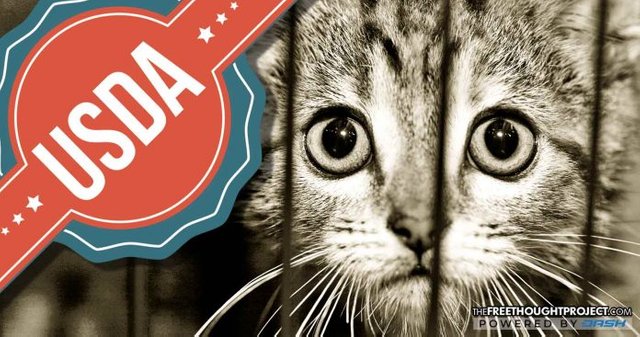Congressman Exposes ‘Secretive’ USDA Experiments that are Incinerating Hundreds of Kittens
By Matt Agorist

Prince George’s County, MD — Rep. Mike Bishop, a Republican representing Michigan’s 8th District, is exposing a program that he calls “secretive and problematic” within the U.S. Department of Agriculture in which hundreds of kittens are being incinerated in Maryland.
According to the USDA, the breeding and subsequent mass killing of kittens is essential to understanding and combating a dangerous parasite. However, citing inhumane procedures and wasted taxpayer funds, Bishop has called for an official investigation into the program.
On Tuesday, Bishop sent a letter to Agriculture Secretary Sonny Perdue citing his and other’s concerns on how the kitten are being used in the program. As WTOP reports, according to the letter, Bishop says that his office reviewed documents about a research project on toxoplasmosis conducted at the USDA’s Animal Parasitic Diseases Laboratory in Beltsville, Maryland.
The secret experiments were brought to light after a Freedom of Information Act request was filed by the anti-animal research group White Coat Waste Project.
According to Bishop, the experiments involve breeding hundreds of kittens, feeding them parasite infected raw meet for several weeks and then burning them. The kittens are essentially test tubes as they are only bred so that their feces can be used in later experiments.
“I’m shocked and disturbed that for decades the USDA — the very organization charged with enforcing animal welfare laws — has been unnecessarily killing hundreds of kittens in expensive and inefficient lab experiments,” Bishop said in a statement.
“Any government research program like this one that’s been funded since the Nixon administration needs to be put under the microscope, especially when it involves using kittens as disposable test tubes in harmful tests that most taxpayers oppose.”
According to Bishop, the USDA protocol indicates that the cats who are fed the infected meat do not become sick.
Bishop’s letter demands to know the cost to the taxpayer, the precise number of kittens used, pain reporting to see how bad the kittens are suffering, and alternatives to using kittens and possible adoption procedures. “It appears that this project uses kittens as test tubes,” Bishop wrote. “Put simply, it creates life to destroy life.
While I support the objective of making food safer and protecting people and animals from infectious diseases, we must ensure taxpayer dollars are used effectively, efficiently, and humanely.” After receiving the letter on Tuesday, Kim Kaplan of the USDA responded by claiming that the use of cats is “essential to the success of this critical research,” and that “the estimate of 100 cats used in the research … is a serious overestimation.”
Kaplan also explained that the cats cannot be adopted out because even though they may not be infected they still pose a risk to others through their fecal matter.
However, expert authorities–including the American Veterinary Medical Association, the American Association of Veterinary Medical Colleges and the Centers for Disease Control and Prevention–agree that the Toxoplasma-exposed cats are safe and adoptable because after just one Toxoplasma exposure, cats shed the parasite, become immune and won’t transmit to humans or other animals, according to the White Coat Waste Project.
As to why they use kittens, the USDA explained, “only cats are found to excrete the environmentally resistant stage of the parasite.” In regard to the incineration of kittens, cost to taxpayers, and pain reporting, however, the USDA chose to remain silent, only stating that the lab “complies with best management practices in animal research.”
Naturally, no one wants to ingest harmful parasites and get sick and the research likely provides some benefit in this regard. However, the length of time that it has been going on indicates that the research is either ineffective or the program is merely trying to justify its funding by continuing experiments.
According to Bishop, the research has been ongoing at the USDA since 1982, and at 100 kittens a year, the death toll is staggering. As the WCWP points out, these deadly, decades-old taxpayer-funded kitten experiments also continue despite criticism from veterinary experts who call the kitten model “difficult and expensive,” say it raises “ethical concerns,” and are advocating for development on in vitro models.
If this was a private corporation doing this exact same thing, the USDA would likely be stepping in to stop it. However, because they are the government, they can do as they wish.

We are the Free Thought Project — a hub for Free Thinking conversations about the promotion of liberty and the daunting task of government accountability. All of our content was created by our team of artists and writers. Learn more about us on our website thefreethoughtproject.com.
The USDA was never about any of this.
It was about bring back consumer confidence in one of the largest slaughter houses after they poisoned lots of their clients.
What it says on the can, is not what's inside.
Plus, when was the last time government protected anybody from anything?
To listen to the audio version of this article click on the play image.

Brought to you by @tts. If you find it useful please consider upvote this reply.